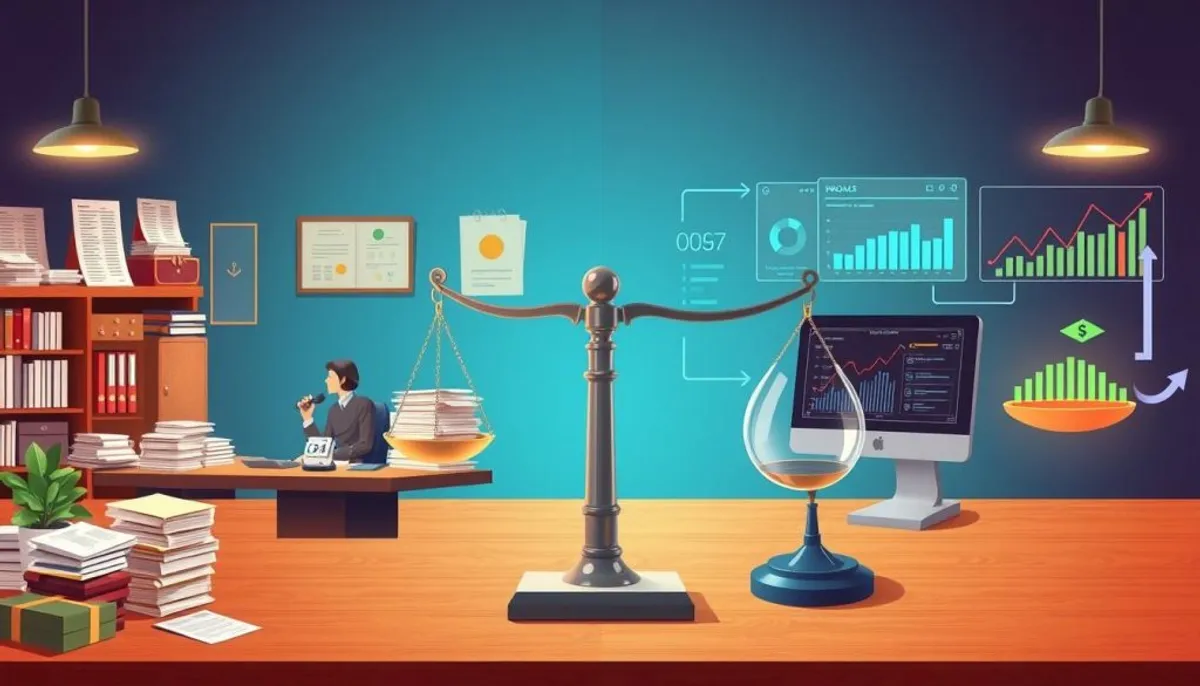Are overdue payments impacting your business? A debt recovery agency could be the answer. Collection services are designed to reclaim what’s owed to you, enhancing your cash flow and financial health. Let’s examine how professional debt collectors can aid in retrieving those persistent unpaid bills.

Debt collectors employ diverse strategies to reach out to delinquent customers, including phone calls, emails, and letters. They are adept at securing payments, often operating on a contingency basis. This arrangement means they only receive compensation upon successful debt collection, typically charging between 15% to 33% of the recovered sum.
Key Takeaways
- Debt collectors specialize in recovering overdue payments
- They use multiple contact methods to reach debtors
- Collection agencies can improve business cash flow
- Most work on a contingency basis, charging 15-33% of collected debt
- The Fair Debt Collection Practices Act (FDCPA) regulates collection practices
- Consumers have rights, including disputing debts within 30 days
- Debt collectors must follow strict rules when contacting debtors
Understanding Professional Debt Collection Services
Professional debt collection services are indispensable in managing accounts receivable. These third-party entities assist businesses in recovering unpaid debts, thus ensuring a steady cash flow. Exploring the realm of debt collection agencies reveals their significant impact on business operations.
What is a Private Collection Agency (PCA)?
A Private Collection Agency is dedicated to retrieving delinquent debts for businesses. PCAs employ various tactics to secure payments, including negotiating settlements and establishing payment plans. They adhere to strict legal standards, ensuring fair debt collection practices.
Types of Debt Collection Services
Debt collection agencies provide a range of services, catering to diverse business requirements:
- Pre-collection services
- Full-service debt recovery
- Skip tracing to locate debtors
- Legal collections for court-ordered judgments
The Role of Collection Agencies in Business
Collection agencies are crucial for effective accounts receivable management. They contribute by:
- Recovering overdue accounts
- Enhancing cash flow
- Releasing internal resources
- Offering expertise in debt recovery strategies
| Service Type | Average Fee | Success Rate |
|---|---|---|
| Pre-collection | Flat fee | 70-80% |
| Full-service | 25-45% of collected amount | 50-60% |
| Legal collections | 33-50% of collected amount | 30-40% |
By tapping into the expertise of third-party debt collectors, businesses can enhance their accounts receivable management. This allows them to concentrate on their core operations.
Signs It’s Time to Hire a Debt Collector
Identifying the right moment to engage professional debt collectors is vital for preserving your business’s financial health. The necessity for delinquent account recovery becomes apparent when specific warning signs emerge in your financial environment.
Past Due Accounts Exceeding 90 Days
When invoices linger beyond the 90-day threshold, it signals the need for professional intervention. Bills overdue for more than 90 days necessitate the expertise of a debt collection agency to mitigate financial losses. Such professionals are equipped with the necessary skills and resources to efficiently manage these complex cases.
Impact on Business Cash Flow
Cash flow problems can severely harm small businesses. In fact, 29% of small enterprises fail due to cash flow issues. Effective debt collection strategies can help mitigate these problems, ensuring your business’s financial stability.
Customer Avoidance Patterns
Consistent evasion of payment or frequent excuses from customers indicate the need for professional assistance. The most adept debt collection agencies boast high annual recovery rates and extensive experience in managing such scenarios.
| Metric | Industry Average | Brennan & Clark |
|---|---|---|
| Annual Training Hours | 78 hours | 312 hours |
| Success Rate | Baseline | 20% higher |
| Direct Contact | Varies | 800-858-7600 |
It’s important to note that debt collection laws vary by state and are subject to periodic updates due to the Fair Debt Collection Practices Act (FDCPA). Professional debt collectors are well-versed in these regulations, ensuring adherence to legal standards throughout the delinquent account recovery process.
How Professional Debt Collectors Operate
Professional debt collectors employ a variety of strategies to reclaim debts. Collection agencies and debt recovery entities rely on skilled professionals. These individuals scour databases, engage in phone calls, and dispatch collection letters to track down debtors.
Debt collectors frequently engage in negotiations to secure full or partial payments. They establish payment agreements or implement administrative wage garnishment. Skip tracing services are utilized to locate debtors who have altered their contact information.

- Initial contact with the debtor
- Verification of debt details
- Negotiation of payment terms
- Implementation of payment plan
- Follow-up and monitoring
Debt collectors must comply with the Fair Debt Collection Practices Act (FDCPA). This legislation safeguards consumers from abusive or deceptive practices. It outlines guidelines for communication times, language usage, and debt verification procedures.
| Aspect | Detail |
|---|---|
| Credit Report Impact | Late payments can remain for up to 7 years |
| Legal Action | Collectors can sue to recover past-due debts |
| Bank Account Access | Requires court judgment |
| Industry Size | Over 230,000 professionals in the U.S. |
Collection agencies frequently specialize in particular industries. This specialization ensures their collectors possess the necessary industry-specific knowledge. Such expertise facilitates effective communication with debtors, enhancing the prospects of successful debt recovery.
Legal Framework and Compliance in Debt Collection
Debt collection companies operate within a complex legal framework. This ensures fair practices in accounts receivable management. The laws protect both creditors and debtors.
Fair Debt Collection Practices Act (FDCPA)
The FDCPA is the main law governing debt collection. It sets rules for debt collection companies. They can’t call before 8 a.m. or after 9 p.m. They must stop contacting debtors represented by lawyers. The law bans unfair practices like threats or insults.
State-Specific Regulations
Each state has its own debt collection laws. These often mirror the FDCPA. Some states cover original creditors too. California and Texas have strict rules for accounts receivable management.
Debtor Rights and Protections
Debtors have strong rights under these laws. They can dispute debts within 30 days. They can ask collectors to stop contacting them. The Fair Credit Reporting Act lets them challenge wrong information on credit reports.
| Law | Key Protection |
|---|---|
| FDCPA | Limits contact hours |
| FCRA | Ensures credit report accuracy |
| TCPA | Regulates telemarketing calls |
Debt collection companies must follow these laws closely. Breaking them can lead to fines and legal action. Debtors facing unfair practices can file complaints with the Consumer Financial Protection Bureau.
Introducing ti3: A Modern Alternative to Traditional Collections
In the realm of accounts receivable management, a new entity is revolutionizing the landscape. ti3, a state-of-the-art SaaS platform, introduces a novel methodology for managing overdue payments. This innovative solution enhances the efficiency and cost-effectiveness of the collection process, surpassing traditional methods.
Automated Payment Reminders
ti3 eradicates the tedious task of pursuing unpaid invoices. It dispatches automated reminders to customers with overdue payments, thus conserving time and diminishing human error. This systematic methodology ensures that no late account is overlooked, significantly boosting collection rates.
Streamlined Collection Process
The era of intricate, manual collection procedures is behind us. ti3 simplifies the entire process, from initial notification to payment collection. It automatically escalates issues when necessary, enabling businesses to concentrate on their core activities while efficiently managing their accounts receivable.
Client Relationship Management
Unlike traditional debt collectors, ti3 prioritizes maintaining positive client relationships. Its professional, non-confrontational approach to overdue payments safeguards customer goodwill. The platform’s user-friendly interface facilitates effortless tracking of customer interactions, ensuring a respectful and efficient collection process.
Through the utilization of technology, ti3 presents a balanced solution to the challenges of accounts receivable management. It harmonizes the efficiency of automation with the subtlety of preserving good customer relations, positioning itself as a valuable asset for businesses of all sizes.
Cost Analysis: Traditional vs. Automated Collection Methods
In the realm of debt recovery, businesses face a critical decision between traditional and automated methods. The choice hinges on both cost and efficiency. Traditional agencies often employ a contingency fee model, where the fee is a percentage of the collected amount. In contrast, automated services present a more economical alternative.

The Kaplan Group exemplifies a tiered fee structure in debt collection. For claims under $1,000, they charge a 50% contingency fee. This rate diminishes as claim values escalate, reaching a 10% fee for claims exceeding $500,000. Yet, the success rate of these services is paramount, eclipsing the significance of the fee itself.
| Claim Amount | Contingency Fee |
|---|---|
| $1,000 and under | 50% |
| $1,000 – $5,000 | 25% |
| $5,000 – $50,000 | 20% |
| $50,000 – $500,000 | 15% |
| Over $500,000 | 10% |
Automated collection services, on the other hand, adopt a distinct strategy. They leverage letter campaigns, overseas collectors, and call centers to efficiently manage a plethora of smaller claims. This approach enables the provision of lower fees, sometimes as low as $15 per account.
The age of the debt also influences the cost structure. Agencies may charge a 20% contingency fee for debts less than 90 days old, escalating to 40% for those between 1-2 years old. This reflects the diminishing likelihood of successful collection as time progresses. For instance, debts 6 months past due have a mere 50% chance of being collected.
Businesses must thoughtfully consider these factors when deciding between traditional debt recovery agencies and automated collection services. While traditional methods offer a personalized touch, automated systems are more cost-effective for handling numerous smaller claims.
Steps Before You Hire a Debt Collector
Before engaging a debt collector for overdue payments, several preparatory steps are crucial. These measures can significantly reduce costs and preserve customer relationships. They are essential for a successful debt collection process.
Internal Collection Attempts
Initiate your own debt collection efforts. Begin by sending amicable reminders and promptly addressing late payments. Establishing transparent invoice terms is vital to prevent misinterpretations. If necessary, prepare collection letters, but it’s advisable to consult legal professionals beforehand.
Documentation Requirements
Maintain meticulous records of all interactions with debtors. This encompasses:
- Invoices and payment terms
- Communication logs
- Payment history
- Agreements or contracts
Accurate documentation is indispensable, should you decide to outsource debt collection later.
Communication Strategies
Employ effective communication tactics to recover overdue payments:
- Be polite yet assertive
- Propose payment plans when feasible
- Employ diverse contact methods (phone, email, mail)
- Document all interactions
If internal efforts fail, it may be time to seek professional debt collection services. Opt for agencies with extensive experience, adhering to laws such as FDCPA and HIPAA. Select a collector known for personalized solutions and transparent pricing to ensure efficient debt recovery.
| Consideration | Importance |
|---|---|
| Agency Experience | 65+ years preferred |
| Legal Compliance | FDCPA, HIPAA, FCRA |
| Communication Style | Personalized approach |
| Pricing Structure | Clear, contingency-based |
| Customer Service | Exceptional quality |
Choosing the Right Collection Agency
Selecting the ideal collection agency for your business requires careful consideration. Professional debt collectors can significantly impact your cash flow and customer relationships. Let’s explore key factors to consider when making this crucial decision.
Licensing and Insurance Verification
Before partnering with collection agencies, verify their licensing and insurance status. Each state has unique requirements, so ensure the agency complies with local regulations. This step safeguards your business from potential legal issues and demonstrates the agency’s commitment to professionalism.
Industry Specialization
Choose an agency that specializes in your business size and industry. Collection agencies with experience in your field are more likely to understand your specific challenges and employ effective strategies. For instance, property management collections may require different approaches than healthcare debt recovery.
Success Rate Assessment
Evaluate the agency’s success rate to gauge their effectiveness. Top collection agencies focus on facilitating easier payment methods and early intervention. They should provide regular reports on collection rates, with at least monthly statements and online access to recovery rates.
| Factor | Importance |
|---|---|
| Licensing | Essential for legal compliance |
| Industry Experience | Crucial for effective strategies |
| Success Rate | Key indicator of performance |
| Reporting Frequency | Monthly minimum |
Remember, a low agency percentage doesn’t always mean better value. Agencies with higher fee rates but better recovery rates may provide a higher return on investment. Choose wisely to ensure your business gets the best debt collection service possible.
The Debt Collection Process Timeline
Understanding the debt collection timeline is crucial for both creditors and debtors. The process typically begins when a payment is 30 days past due. At this point, the original creditor may start internal collection efforts.
If the debt remains unpaid after 60 days, it might be turned over to a debt recovery agency. These agencies often purchase the debt for about 30-35% of the balance due. They then employ various collection services to recover the amount.
The timeline can extend significantly depending on various factors. For instance, the statute of limitations on debt collection ranges from 3 to 15 years, varying by location. This affects how long a collection agency can pursue legal action.
| Timeline Stage | Action | Time Frame |
|---|---|---|
| Initial Delinquency | Internal collection efforts | 30-60 days past due |
| Agency Involvement | Debt turned over to collection agency | 60+ days past due |
| Legal Action | Summons issued | Varies, debtor has 20-30 days to respond |
| Credit Report Impact | Collections reported | Up to 7 years + 180 days |
If legal action is taken, debtors must respond within 20-30 days of receiving a summons. The process may involve evidence sharing, negotiations, and court proceedings. Ultimately, creditors might pursue remedies like wage garnishment or asset seizure if a judgment is obtained.
Maintaining Professional Business Relationships During Collections
Effective accounts receivable management requires a balance between firm collection practices and empathy. This balance is essential for maintaining business relationships while recovering debts. Collection services are pivotal in navigating this complex process.
Communication Best Practices
Clear, respectful communication is fundamental in professional debt collection. Phone calls are a primary method, enabling personal interaction. Being well-prepared before contacting debtors demonstrates a positive approach. Giving full attention during calls enhances the likelihood of successful payments.
Dispute Resolution Strategies
Addressing customer concerns promptly is crucial in accounts receivable management. Listening attentively to client issues is a strategic approach in debt collection. Instead of pushing through difficult conversations, rescheduling can lead to better outcomes. Focusing on solutions rather than blame increases payment probabilities.
Customer Retention Techniques
Maintaining professionalism in all communications prevents clients from severing ties. Offering flexible payment options when possible shows understanding of temporary financial difficulties. This is crucial for long-term clients. By balancing firmness with flexibility, collection services can help businesses maintain positive relationships while effectively recovering debts.
Remember, ethical debt collection practices can preserve positive relationships. A neutral third-party for debt collection can help debtors save face and maintain positive future relationships. This approach ensures that accounts receivable management does not harm your company’s reputation.
Conclusion
Hiring a debt collector or debt recovery agency can be transformative for businesses facing cash flow challenges. With 82% of companies failing due to financial constraints, such services offer a critical lifeline. They not only recover overdue payments swiftly but also prevent future losses by analyzing credit histories.
Collection agencies bring expertise that can significantly boost your bottom line. They settle debts quickly and cost-effectively, enhancing cash flow within months. Their expertise ensures compliance with complex debt collection laws, reducing legal risks for your business. This allows you to focus on core activities while experts handle the challenging task of debt recovery.
While hiring a debt collector may seem aggressive, it’s often necessary for financial stability. The key is choosing the right agency that balances effective collection with maintaining professional relationships. By doing so, you’ll not only recover what’s owed but also protect your business’s long-term financial health and reputation in the competitive market.
RelatedRelated articles



